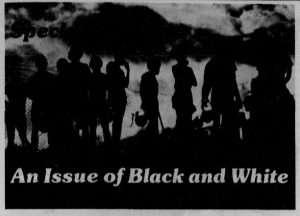by Vishwesh Mehta
Vishwesh Mehta is a senior from Mumbai, India, majoring in Rhetoric and Communication Studies. Vishwesh began his involvement in the Race & Racism Project in the Spring of 2017, when he was enrolled in an independent study course, and continued his participation through the summer as the Social Media and Public Relations Intern for the project. He has been compelled by the archive’s ground level perspective on conversations and incidents involving race on the University campus. This post was written as a part of Digital Memory & the Archive, a course offered in Fall 2017.
The article being examined today–“RC Senator Impeached“–is one published in the Collegian in 1973 shortly after University of Richmond started integrating themselves and started accepting more black students. This article speaks about how a Richmond College student, Stanley Davis, was impeached as a Richmond College Senator for various reasons by a unanimous decision. Davis was elected as RC senator one year before his impeachment, in 1972. He was the first ever black senator to be elected to student government. This incident seems to be standard procedure, but when looked at closely, this incident said a lot about how far the university had come with regards to integration. This was an indicator towards the transition from explicit and blatant racism to implicit and structural racism. However, the Richmond College Student Government Association (RCSGA) has come a long way when examined today.







